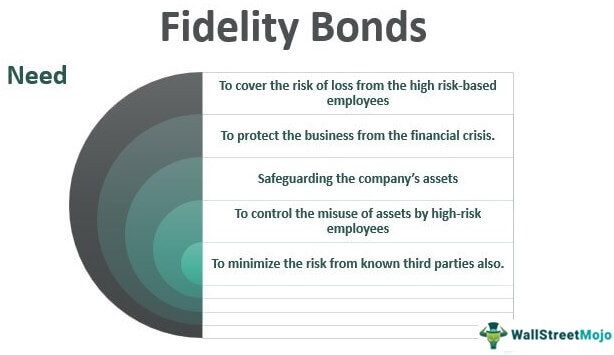Table Of Contents
What Are Fidelity Bonds?
Fidelity bonds are a type of insurance policy that covers the risk pertaining to the loss to the business from fraudulent acts such as theft, forgery, misuse of assets and unauthorized sale of assets, data theft, etc. by the employees of the company. It is called an employee dishonesty fund in Australia, and fidelity guarantee insurance in the United Kingdom.

Corporations readily spend on fidelity bond costs as a part of their risk management strategy to ensure their software, human resources, company data, and other factors within the system are safe from manipulation from within the organization. However, it is important to note that these bonds cannot be traded as other securities.
Key Takeaways
- A fidelity bond, also known as an employee dishonesty bond, is an insurance product that offers coverage against losses resulting from acts of dishonesty, theft, fraud, or other dishonest behaviors.
- Fidelity bonds protect businesses and organizations from financial losses caused by the actions of their employees.
- These bonds typically provide coverage for current and former employees and can be tailored to meet the specific requirements of the insured party.
- Fidelity bonds are commonly utilized in industries where employees can access financial assets, sensitive information, or valuable property. Such industries include banking, financial services, insurance, and retail.
Fidelity Bonds Explained
Fidelity Bonds are a type of insurance policy covering the loss of theft, forgery, misuse of assets by the employees, and the known third parties. It is beneficial for companies with a large number of employees or the company that employs employee from a criminal background.
It is the same as the criminal policy, but it covers more than the illegal policy. It provides financial security to the company in case of loss due to acts of known parties. But at the same time, the fraud can be deliberately planned by the organizations to claim against the policy.
The premium is also high in the case of fidelity bonds; hence the cost of the company increases. It also continuously tracked the actions of increased risk-based parties; therefore, the chances of misuse of assets by them got reduced.
They are designed to protect the business from the risk of loss by the dishonest acts of the employees. In large organizations where the numbers of employees are more and less reliable, fidelity bond insurance can be purchased to cover the risk of loss due to acts of employees.
These bonds are like an insurance policy that covers the risk. These bonds are not tradable in the market. The aim behind this is to protect the assets of the business organization.
The bonds are classified as first-party and third-party bonds; each covers different types of employees. It also covers the risk of loss from known third parties like clients, competitors, suppliers, etc., who can intentionally harm the business.
Types
Let us understand the different types offered for corporates by fidelity bond funds through the discussion below. This will give us an in-detail understanding of the concept.

#1 - First Party Bonds
The First Party Bonds cover the risk of fraudulent acts directly related to the company. It includes employees, clients, suppliers, customers, etc. Fraudulent acts include theft, fraud, manipulation, etc.
#2 - Third-Party Bonds
Third-party bonds cover the risk of fraudulent acts from the persons connected with the company under the contract like contractual employees, freelancers, consultants, intermediaries, etc., and the act includes fraud, misuse, or selling of information, unlawful disclosures, etc.
How to Buy?
For any corporation looking to insure themselves for losses due to the employees of their company, they incur a fidelity bond cost as a part of their risk management. Let us understand how it can be purchased through the discussion below.
- The employer can apply it if he is employing high-risk employees, or he has a threat in mind that some high-risk parties related to the business can cause a loss to the business. It can be recommended by the employer to their employees to purchase the same.
- Fidelity bonds are obtained through insurance companies, insurance agents, or banks. They will check the eligibility for purchasing such bonds, and then after verifying the details provided, they will issue the bonds chosen by the policyholder.
- The insurer can also suggest the type of bond to be taken as per the requirements of the insured. It can also be purchased from approved surety companies.
Requirements
To acquire a fidelity bonds insurance there are certain requirements that must be fulfilled by corporations to qualify for the application. Let us understand the requirements through the points below.
- In case of contribution to the schemes covered by the Employee Retirement Income Security Act, the fidelity bonds are required to purchase at 10 percent of the value of plan assets.
- Only the employees or parties which are concerned directly with cash, cheques, other property, or any useful information, authorized persons are covered for fidelity bond policy.
- For the purchase, employers should have employees; the self-employed cannot purchase fidelity bonds.
- The minimum amount to be invested in fidelity bonds is $ 1,000 or 10% of plan assets, whichever is higher, and the maximum amount is $ 500,000. In case the plan holds the employer securities also then the full amount is $ 1 million.
Need
Despite the fact that there are multiple insurance products that can cover the risks of similar nature, fidelity bond funds are corporate’s favorite for a reason. Let us understand the need for such insurance against losses through the explanation below.
- To cover the risk of loss from the high-risk-based employees.
- To protect the business from the financial crisis by the act of others related to the business.
- To minimize the risk from known third parties also.
- It is safeguarding the company’s assets.
- To control the misuse of assets by high-risk employees as insurance companies continually track the actions of high-risk-based employees and third parties.
Importance
Let us understand the importance of incurring fidelity bond costs and why corporations do not mind spending on these for hedging their risks of losses.
- It protects against criminal acts or fraudulent acts by employees and third parties.
- These bonds continuously track the records and actions of high-risk-based employees; hence the chances of misuse of assets by employees are reduced.
- It protects the company from financial loss.
Advantages
Several advantages of fidelity bond insurance and the bond itself have been mentioned through the article. However, below is a concentrated list of advantages that benefit corporations against losses.
- Provide risk coverage for criminal, fraudulent, and loss-making actions.
- Reduce the risk of fraud by the persons covered as the insurer continuously under observes them.
- Reimburse the loss as well as punish the culprit.
- Benefited from an organization with a large number of employees.
- Gives employment to honest employees from a criminal background as the business organization can provide a chance for these employees by taking the Fidelity Bonds.
Disadvantages
Despite the various advantages mentioned above, there are a few factors that prove to be a hassle for corporations. Let us understand the disadvantages of fidelity bond funds through the points below.
- Only risks of loss by known parties are covered.
- It gives a chance to the company to plan the fraud and claim the loss from fidelity insurance bonds.
- The high cost of purchasing the bonds.
- It frees the companies from the risk of loss due to criminal and other acts and results in common internal control.
- High chances of fake claims by deliberate fraudulent actions.
